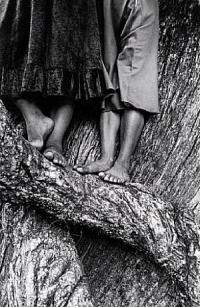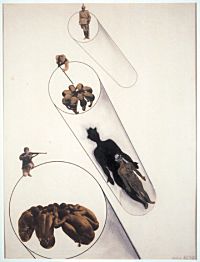
Massenpsychose
László Moholy-Nagy
1927
|

A Momentary Presence
Patrick Shanahan
Patrick Shanahan
A Momentary Presence - Tales from New Europe [PDF]
Joanna Lowry
Can we call these landscapes? Is this a form of landscape photography? Or is it, as Patrick Shanahan calls it in his own introduction to A Momentary Presence - Tales from New Europe, "a documentation of the landscape" ? And what is involved in that moment of refusal of the term? On the one hand it is a refusal that marks a shift in the dialectic between two genres, between documentary photography and landscape photography as historically formed practices. On the other hand it marks a parallel shift between a notion of landscape as an aesthetic as one kind of cultural strategy through which we might represent or view the physical world, and the very di erent notion of landscape "out there", pre-formed by geographical and historical forces that give it its form, and merely found by the photographer. Presented like this we can see that even to use the term `landscape' opens up a range of complex issues about the role of genre and aesthetics as critical strategies in contemporary photographic practice.
via Conscientious
_______________________
Remediating Orwell's Diaries
Sonja Drimmer
if:book
... what happens when (a famous author's) personal diaries get remediated in blog form?
In the case of Orwell's diary, it walks and talks like a blog, but it isn't quite a blog. The site uses a standard template from Wordpress, with a double banner-- one for the Orwell Prize and the other announcing the site as the "Orwell Diaries" in a sans serif font above an image of a few lines from the diaries. (Speaking of which, I'm curious as to the singularizing of what, in its original form, is plural-- will each new diary be presented in a different format or be somehow marked?...(more)
.....................................................
Remediation
Understanding New Media
Jay David Bolter and Richard Grusin
Table of Contents and Sample Chapters
_______________________

Onwards Quietly Stepped The Little Procession
The Cuckoo Clock
Mrs. Molesworth
Illustrations By
Walter Crane
August 15, 1845 - March 14, 1915
Walter Crane - Artist and socialist
Working Class Movement Library
_______________________
Talking Trash, Talking Class:
What's a Working Class Poetic, and Where Would I Find One?
Kathy Lou Schultz
Misfittings of the Text
HOW2, September, 1999
_______________________
Are our innocent joies de Tweet enabling market impetus for deep, always-on, persistent and panoptic commodification, archiving and monetization of what used to be considered our interiority -- motions of the soul?
- Tom Matrullo
.....................................................
Visible Technologies Reaches Milestone with 100 Million Social Media Conversations
SEATTLE, Aug 13, 2008 (BUSINESS WIRE) -- Visible Technologies, a leading provider of social media monitoring and engagement solutions, today announced it now analyzes more than 100 million social media conversations -- from blogs, wikis, forums, Twitter, social networks and other online hubs -- to help brands engage with consumers online, enabling the company to quadruple its sales in 2008.
Visible Technologies captures and analyzes the entire conversation thread, including comments, where 70 percent of social media conversations occur.
_______________________
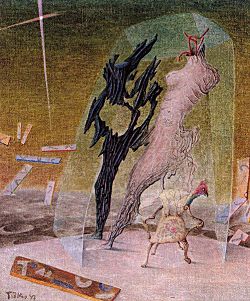
In The Glass Case
Heinz Trökes
(1913-1997)
A Selection Of German Expressionist Prints
_______________________
Culture is a wrinkled palimpsest, and the arrow of history moves like a swallow, if not a boomerang.
Postmodernism, Etc.: An Interview with Ihab Hassan Frank L. Cioffi Style, Fall, 1999
Deep in the unconscious of the academic humanities there is a story, and it goes something like this. "Once upon a time, along, dark time ago, there was a tribe of writers in the American South, terribly misnamed the New Critics. They paid inordinate attention to the forms of literary works, and to special devices like irony and paradox. For an unconscionable time, they dominated the reading scene. But when the sixties finally arrived, thank God, the New Critics were exposed for their literary exclusiveness and political conservatism. The air was cleared, and adventurous young critics began to turn to Continental Europe for inspiration: to existentialism and phenomenology, to the philosophy of consciousness and reception theory, to critical philosophy, to structuralism. These critics gestured in the right direction, but they had to wait for the advent of poststructuralism to discover the full possibilities of their deconstructive art. Deconstruction, alas, soon became tedious, hollow, disengaged. Feminist, et hnic, posteolonial, and cultural studies came to the rescue, saving deconstruction from its innate sterility, and enriching their own socio-political 'agenda'--yes, that's the word--with all kinds of subtle demystifications and demythifications. It may be safely said that with the current prevalence of cultural studies, in their varied forms, criticism has reached its apogee. It only remains for us to stand our ground against sundry humanists, reactionaries, counter-revolutionaries, and proto-fascists still skulking in the corridors of academe."
Parody, you cry, caricature! Caricatures have a disconcerting habit of coming to life in academe, especially in American academe. But let that pass: the point is that a self-congratulatory myth of progress informs criticism in the era of cultural wars. Progress? Culture is a wrinkled palimpsest, and the arrow of history moves like a swallow, if not a boomerang. As Thomas Kuhn has argued, the sciences and the humanities develop with disparate logics. There are no Ptolemaists or Nostradamists in reputable science departments; there are, however, Platonists, Aristotelians, Thomists, Kantians, Hegelians, Marxists, Nietzscheans, Freudians, Heideggerians, Lacanians, Foucauldians [ldots] in reputable departments of the humanities. This is not to say that the paradigms of science are "better"; it is only to say that they respond to different criteria of confirmation and disconfirmation. The paradigms of the humanities--Kuhn would say "schools"--respond to fashion, true, but also to genuine needs for social change. T his last is admirable, though it signals no epistemological progress. The opinions of certain influential critics receive no sanction from a logic of inexorable ascent in our ideas about human reality....(more)
_______________________
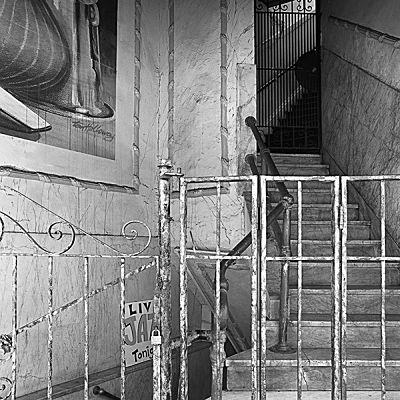
George LeChat
Project Notes (2)
George LeChat
For a while now, I’ve been making pictures of San Francisco with the title Gray City.
The truth is, though, that I'm a little uncertain about this project. I know what I want to accomplish: photographs of San Francisco that show what life feels like here, what the city itself feels like, its gentleness and elegance and grit. But I have a lot of questions....(more)
_______________________
Butterflies on a wheel
Migrants meet in western Wyoming
Anthony Doerr
The brain contains, always, two opposing desires: the urge to stay and the urge to run. One hour our house feels peaceful and snug; the next, I’m yanking open windows at two in the morning with my heart thudding against the darkness. Sixteen trips across the United States, a windshield grimed with heat and fingerprints, a grille caked with dust and insects, and I still think about those butterflies, resting for a moment on my sleeve, a ten-second lull in a merciless journey....(more)
Granta 102: The New Nature Writing
Editor’s Letter
The New Nature Writing
Jason Cowley
Granta 102
When we began to commission articles for this issue we were interested less in what might be called old nature writing – by which I mean the lyrical pastoral tradition of the romantic wanderer – than in writers who approached their subject in heterodox and experimental ways. We also wanted the contributions to be voice-driven, narratives told in the first person, for the writer to be present in the story, if sometimes only bashfully. The best new nature writing is also an experiment in forms: the field report, the essay, the memoir, the travelogue. If travel writing can often seem like a debased and exhausted genre, nature writing is its opposite: something urgent, vital and alert to the defining particulars of our times.(....)
I was reminded of the final scene of the film of All Quiet on the Western Front – of a young man at war losing his life as he reaches for a butterfly – when I spoke to Lydia Peelle after reading her story ‘Phantom Pain’. Peelle is a writer new to Granta and ‘Phantom Pain’ is the only work of fiction in this issue. ‘The new nature writing,’ she told me, ‘rather than being pastoral or descriptive or simply a natural history essay, has got to be couched in stories – whether fiction or non-fiction – where we as humans are present. Not only as observers, but as intrinsic elements. I feel this is important, because we’ve got to reconnect ourselves to our environment and fellow species in every way we can, every chance we have. In my thinking, it is the tradition of the false notion of separation that has caused us so many problems and led to so much environmental degradation. I believe that it is our great challenge in the twenty-first century to remake the connection. I think our lives depend on it.’...(more)
via 3quarksdaily
_______________________

Patrick Shanahan
_______________________
Ottawa poet Rob Mclennan has a new, extensive page at the Electronic Poetry Center
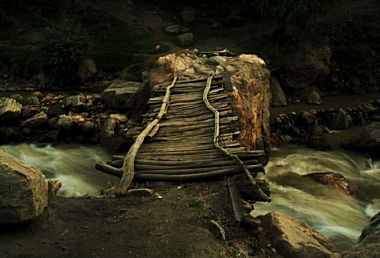
Carolyn Drake
_______________________
A Land Apart
Can Turkey fulfill its promise as a bridge between East and West when its own peoples stand divided?
Christopher Frey
walrus magazine
photographs by Carolyn Drake
winner of the Lange-Taylor Prize
_______________________
As if
Özdemir Asaf
translated from the Turkish by George Messo
This glance is for you to see.
Is there anything more than you?
To the sea, I’ll look to the sea…
Is this all there is of the sea?
Staring only to see something else…
Nature cringes in front of me.
Landscapes pass by the second.
Clouds beneath my feet, you in my head.
At stars, I’m looking at the stars…
You’re here looking with me.
I wonder what happened to the others…
They had words, and enlightened life.
Özdemir Asaf - Nine Poems
Archipelago
_______________________
Borders 2.0: Future, Tense
Angela Mitropoulos
with thanks to Brett Neilson, Bryan Finoki, Melinda Cooper, Aren Aizura and Randy Martin
Arrayed beyond and around the obvious walls of migration control, the architectures and technologies of the border proliferate. These technologies seek to sort, expunge, confine and delay; to sift potential value from non-value; to fix the border inside and round both states and selves; to foreclose the future to versions of an infinitely stuttering present. Just as new instruments of financial debt and the offshore internment facility were exported from their post-colonial laboratories situated beyond Europe and the United States, so ‘civil’, metropolitan spaces have, in turn, been restructured by devices once reserved for those declared to be ‘uncivil’. The partitioning of ‘third’ and ‘first’ worlds, colony and empire, the zoning of regular, waged work and that of precariousness and slavery – these are some of the divisions that have been shaken by the unprecedented movements of people around the world since the late 20th century. Flows shifted course, reversed, the (ex-)colonised moved toward the colonisers. And so there is the militarisation of policing, the amplification of the prison lockdown as urban crowd control, preemptive surveillance and simulated warfare; a diffused fear and suspicion no longer confined to the ‘margins’. To be sure, these expanding technologies often multiply death and suffering in an attempt to re-impose the ways in which misery was previously displaced to others, elsewhere – that is, the marginalised. They aim to reinstall the borders, to fine tune the ramparts of wealth and its extraction, sometimes by new means, often as retrofits. Yet, as such, this expansion indicates the failure of the walls to hold firm against a future which is contingent upon movements that cannot be identified before they occur....(more)
via archive : s0metim3s
_______________________
Borderland: a photo essay by Carolyn Drake
Blueeyes Magazine
_______________________

Precarious Houses
Caroline de Vries
_______________________
Inventing Babylon
Dmitry Kuzmin
in conversation with Peter Golub
jacket
Literature was particularly affected by perestroika: during the first years following the lifting of state censorship nearly every day brought a new text (or rather, old texts which were previously banned); many of these texts caused us to radically reconsider our understanding of literature and culture. The result was a sudden dispersion of style and world view among young authors who entered literature simultaneously, and who seemed to share the same cultural environment. Biographical similarities often caused very disparate authors to band together. This is why aesthetic tolerance is manifest in the Vavilon generation, and not as much in authors from previous generations, whose aesthetics formed in more homogenous climates. Hence, the miscommunication between the younger and older authors, who, apart from some rare exceptions, didn't support members of the young generation; most of the Vavilon authors don't fit easily into the preconceived categories used by the older generations. It could be said that the Vavilon generation is more isolated from the previous generations than the previous generations are from one another.
The above shows that the metaphor of Vavilon is quite fitting: a multitude of artistic languages from which it is impossible to eliminate the cardinal, dominant language. (....)
If we assume that important poetic works are products of the interface between fertile literary tradition and a call of the times, the unique sociological and psychological qualities of the epoch, then we see that before the young poet plugged themselves (even if merely by imitation) into the tradition. Today, many talented young poets from the get-go begin working with the plaster of contemporariness, taking as their foundation contemporary speech models, commercial texts, tabloids, film, and so forth. The plugging into tradition, enrichment of our collective cultural baggage, comes later. Thanks to this, it paradoxically turns out that some of Russian poetry’s “discoveries” of the last few decades (concrete poetry’s openness toward self-generating speech, post-conceptualism’s pursuit of sincere and authentic expression in spite of everything, the objectivist desire for clear expression of the surrounding world in all its originality and detail, interest in gender issue, etc.), these are already attained by the younger generation, and now they work in parallel with older authors....(more)
_______________________
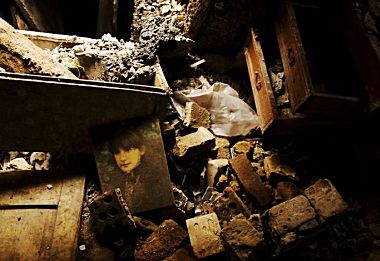 Carolyn Drake
_______________________
owards a foreign likeness bent: translation
duration press
contributors:
Ammiel Alcalay, Charles Bernstein, Norma Cole, Marcella Durand, Forrest Gander, Bill Marsh, Sawako Nakayasu, Kristin Prevallet, Ryoko Sekiguchi, Jonathan Skinner, Rick Snyder, Jalal Toufic, Keith Waldrop, Rosmarie Waldrop, Chet Wiener
.....................................................
Irreducible Strangeness
Rosmarie Waldrop
owards a foreign likeness bent: translation
Which particular features of the foreign language a translater tries to keep depends on the nature of the particular foreign text. The most radical example I know is Celia and Louis Zukofsky’s monumental Catullus which tries to keep the sound of the words, almost phoneme by phoneme, while also conveying the meaning. Their translation, says the preface, “follows the sound, rhythm, and syntax of his Latin — tries, as is said, to breathe the ‘literal’ meaning with him.” The grandeur of this impossible ambition to transfer everything intact is overwhelming. So is the Zukofskys’ sheer persistence: they do not just tackle one poem or two in this manner, but all of Catullus.
I am fascinated by this focus on sound (which is also a bit quixotic because we don’t even know very well what Latin sounded like), and by this project of “breathing the ‘literal’ meaning.” There are brilliant successes. For instance, the famous opening, “Miser Catulle” (something like “poor old Catullus”) becomes “Miss her, Catullus?” Here, both the single sound and the whole poem enter into the translation because “missing her” is indeed the root of Catullus’s misery.
When I look at Catullus 85 :
Odi et amo, quare id faciam, fortasse, requiris.
nescio, sed fieri sentio et excrucior.
(literally:
I hate and love, why I do so you may well ask.
I don’t know, but I feel it happen and suffer.)
and find:
O th’hate I move love. Quarry it fact I am, for that’s so re queries.
Nescience, say th’fiery scent I owe whets crookeder.
I am amazed that the English does indeed sound like the Latin, amazed by the sheer strangeness of diction
which nevertheless manages to suggest some of the Latin’s meaning. _______________________
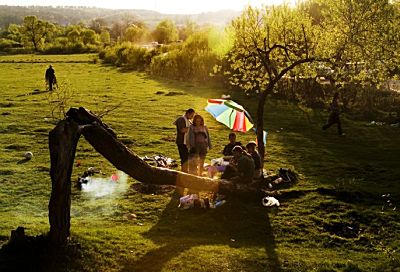 Carolyn Drake
_______________________
Come with Me to the Countryside
Tristan Tzara
Translated from the Romanian by Victor Pambuccian
words without borders
House under construction with dried branches, like spiders, in your scaffolding
Rise to skies with serenity
Until the clouds will have served as curtains
And the stars: relief for lamps on balconies in the evening.
Between two chestnut trees burdened like discharged patients
Grew the Jewish cemetery - out of boulders;
On the outskirts of town, on a hill,
Graves crawl like worms.
The yellow dogcart waits for us at the train station
In me reeds get torn with a paper rustle
I'd like to come to an end slowly all across the country
And that my soul would hesitate like a dancer on a string.
...(more)
_______________________
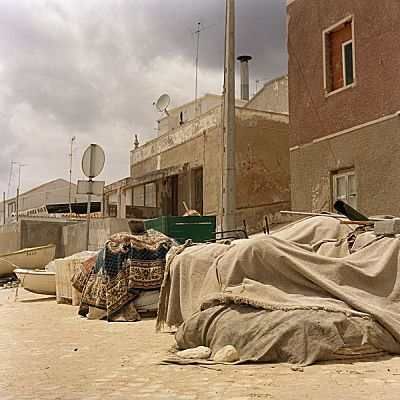
Salema
Caroline de Vries
_______________________
A Wave Of Dreams
Louis Aragon
translated by Adam Cornford
duration press
Translator's Note: This essay was first published in 1924, in the avant-garde journal Commerce. It is the only sustained account by an original participant of the "period of trances" that preceded the formal constitution of the Surrealist group. It also constitutes one of the very first expressions of Surrealist theory, especially the theory of the Marvelous.
I happen, suddenly, to lose the whole thread of my life: I ask myself, sitting in some corner of the universe, by a smoky dark café, in front of polished bits of metal, amid the comings and goings of large sweet-tempered women, by what road of madness I end up stranded under this arch, which is actually the bridge they call the sky. That moment when everything gets away from me, when huge cracks force their way to light in the palace of the world-I would sacrifice my whole life for it, if it would just consent to persist at such a laughable price. Then, the mind detaches itself a bit from the human mechanism; then, I am no longer the bicycle of my senses, the grindstone for sharpening memories and meetings. Then, I grasp the occasional in myself, I grasp all at once how I surpass myself: the occasional, c'est moi; and having formed this proposition I laugh at the memory of all human activity.
I lived in the shadow of a great white edifice adorned with flags and outcries. I was not allowed to withdraw from this mansion Society, and those who climbed its front steps made a frightful cloud of dust on the doormat. Patriotism, honor, religion, goodness-it was hard to recognize oneself amidst these countless words that they tossed out at random to the echoes. Still, I slowly disentangled their firmest beliefs. These amounted to very little.(....)
By what route a concept may appear, by what detour, is rightly a subject to be marveled at. The idea of surreality should have fit flush with human consciousness of extraordinary schools and the events of the heaped-up centuries.(....)
But among all the tunes I hum from time to time, there is still one that gives me today an illusion of Spring and meadows, an illusion of true freedom. I've lost the tune, and then I get it back. Free, free: it's the time when the wind's chain of bright links flies away through the moirè of the sky, it's the time when the bullet becomes the slave of ankles, when manacles are jewelry. It so happens that on the walls of his dungeon the recluse carves an inscription that makes the sound of wings on the stone. It so happens that he sculpts above the join the feathered symbol of the world's loves. It's because he dreams, and I dream, carried away, I dream. I dream of a long dream where everyone would dream. I don't know what will become of this new venture of dreams. I dream on the shore of the world and of night. What was it you wanted to say to me, men far removed, yelling through cupped hands, making fun the sleeper's gestures? On the shore of night and crime, on the shore of crime and love. O Rivieras of the unreal, your casinos, with no age restriction, open their gaming rooms to those who want to lose! It's time, believe me, not to win any more.
Who's there? Ah, very good: show in the Infinite. ...(more)
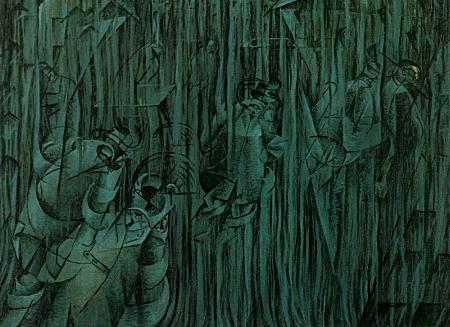
States of Mind III: Those Who Stay
1911
Umberto Boccioni aka summer of '08
Lanark county
_______________________
The Anatomy of Melancholy
Robert Burton (1652)
To speak in a word, there is nothing so vain, absurd, ridiculous, extravagant, impossible, incredible, so monstrous a chimera, so prodigious and strange, such as painters and poets durst not attempt, which they will not really fear, feign, suspect and imagine unto themselves: and that which Lod. Vives said in a jest of a silly country fellow, that killed his ass for drinking up the moon, ut lunam mundo redderet, you may truly say of them in earnest; they will act, conceive all extremes, contrarieties, and contradictions, and that in infinite varieties. Melancholici plane incredibilia sibi persuadent, ut vix omnibus saeculis duo reperti sint, qui idem imaginati sint (Erastus de Lamiis), scarce two of two thousand that concur in the same symptoms. The tower of Babel never yielded such confusion of tongues, as the chaos of melancholy doth variety of symptoms. There is in all melancholy similitudo dissimilis, like men's faces, a disagreeing likeness still; and as in a river we swim in the same place, though not in the same numerical water; as the same instrument affords several lessons, so the same disease yields diversity of symptoms. Which howsoever they be diverse, intricate, and hard to be confined, I will adventure yet in such a vast confusion and generality to bring them into some order; and so descend to particulars.
Classychs: a collection of classics on Psychiatry and Psychology
PsyPlexus
Directory Of Open Access / Free Journals On Mental Health
nudged by Dispatches from Zembla
_______________________
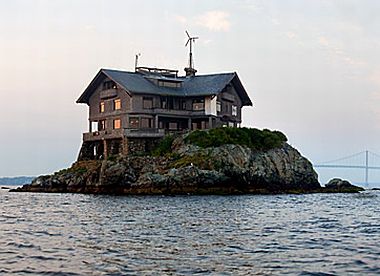
Clingstone
Narragansett Bay
Photo by
Boston Photojournalist Erik Jacobs
The Old House and the Sea
images by Erik Jacobs
The New York Times
via Geoff Manaugh
_______________________
Open Studios: Rachel Blau Duplessis's Blue Studios: Poetry and Its Cultural Work
Catherine Taylor
Throughout Duplessis's project of blurring the boundaries between poetry and prose, or between so-called "creative" and critical work, what may look like her greatest fault, a kind of mess that seems, at first, to come from trying to do too much in too many different ways, almost always turns out to be one of her greatest strengths. She offers a diversity of approaches to her subjects that cohere just enough to offer analysis and conclusion as well as space for the reader to drift and decide. Some of the essays are pocked by the eruption of verse, and while these moments are a kind of mar or blemish, the essays would not be more beautiful without them, but less interesting. The same is true for her sometimes vertiginous shifts of topics and discourses from the autobiographical to the aesthetic.(....)The crux here seems to me to be not whether experimental writing can be shown to be liberatory, but how DuPlessis's versions represent a particularly optimistic, reformist, political poetics. This sense of yearning for change, if not revolution, distinguishes DuPlessis from more ironized poetic movements such as the contemporary Google-based Flarf school where the paratactic pasting of discourse appropriations offers a related linguistic disruption and cultural critique--one that uses what Jacques Rancière in The Future of the Image calls "dialectical montage" to "invest chaotic power in the creation of little machines of the heterogeneous," where "what is involved is revealing one world behind another: the far-off conflict behind home comforts". Flarf and certain other post-avant writings often lean toward the knowing shrug or wink; weaned as they are on cynicism, they no longer retain despair's normative posture of the fetal crouch, and, in fact, might be said to retain only a primal optimism, one to keep going, participating in neither abjection nor optimism. Theirs is a poetics perhaps more comfortable with Mackey's "post-expectant futurity," while Duplessis's essays maintain some attachment to expectancy, although it is hardly naïve. What DuPlessis does throughout her writing is keep the reader focused on moments of (not to get too recursive about it) possibility's possibility. ...(more)
_______________________
from
Our Fair Sentence
Dora Malech
Those days were still wearing their brand-new welcomes,
putting one word—world—in front of another, blazonry
and all good faith therein where was writ dexter, sinister,
pick a number. Any everyman was proud to proclaim
the state of even our disaster’s faster, trophies soldered
fist to plinth to tower over in precipitous dazzle down
to the waterlogged potter’s field in which listed fits pitched
for the night, the beaten band and the broken bank, the seep
where the earth wept up its ichor, war cry whittled to dumb
ditty—shoot first, shoot later—dialectic left for dead and
the closest exit indeed behind us by way of frayed refrain:
say when, say when.
...(more)
Anti-
Anti- is contrarian, a devil’s advocate that primarily stands against the confinement of poetry in too-small boxes. Anti- wants to provide a single arena for a wide range of styles and ideas, so these different kinds of poets and poems can either fight it out or learn to coexist.
via Anny Ballardini at NarcissusWorks
_______________________
Subsidies, Volunteerism and Outsourcing
New Paths Toward the Loss of Our Public Lands
William Willers
“We have a country and a world that is actually run by thieves. That’s the problem.”
– Matt Stoller, July 19, 2008, Netroots Nation Conference, Austin, Texas
There is no physical possession of greater value that Americans can give their descendants than the public domain – national forests, national parks, wildlife refuges and Bureau of Land Management (BLM) lands that together make up a third of the nation. And it’s all yours ”if“, as Ben Franklin once said regarding the Republic itself, “you can hold onto it”. In fact, we are losing our hold, and quickly at that. We're not paying attention, and key players in the “private sector”, that euphemism for what, frankly, alludes to corporations and an inconspicuous wealthy minority, are aiming to become the new landlords....(more)
_______________________
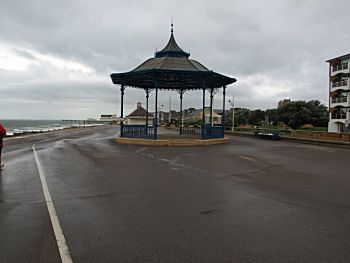
bugger bognor!
infinite thØught at the English seaside
_______________________
More on Poetry and Technology (Sort of)
K. Silem Mohammad
I want to resist any model of poetry as a single sentient organism that has its own agenda. I can't help seeing poetry as a function of surplus intellectual and imaginative energy: not a technology, that is, that operates either in direct sync with the machinations of any hallucination of human "progress," or with any critical apparatus designed to make intelligible--or remediable--the exact physical and psych(ot)ic coordinates of that hallucination.
Why make a case for critical distance, then, you might ask? Why not just a liberatory bacchanal of prosodic impulses, a shooting up of desperately ecstatic flares in the dark space of an ahistorical twilight? Maybe it's a demand I make on nothing more than principle. Maybe I just want my irrational excrescences to come with the added glaze of ideational exertion...(more)
_______________________
Labour Capacity and The Strategy of Refusal, Part II
Jasper Bernes
If you’re like me, the characterization of labor capacity as absolute (rather than determinate) negation in Tronti will start to remind you of the myriad readings of “Bartleby, the Scrivener” that seem de rigueur for European philosophers/theorists (Agamben, Badiou, Deleuze, Derrida and Zizek, among those that I’m aware of, all discuss the story and the character). If you read Marx on labour-capacity, the connection to Bartleby is rather unmistakable. Bartleby (and his less-remarked cousin, the Carpenter, in Moby-Dick) is a perfect exemplification of the antinomies of the working-class subject as both all-containing potentiality and absolute, immiserated de-qualification— in Marx’s words “Labour as object absolute poverty, labour as subject general possibility of wealth.”...(more)
Part I is here]
_______________________

bedroom
Clingstone
Photo by
Boston Photojournalist Erik Jacobs
_______________________
"State of Siege"
Mahmoud Darwish
Tr. Ramsis Amun
Here, where the hills slope before the sunset and the chasm of time
near gardens whose shades have been cast aside
we do what prisoners do
we do what the jobless do
we sow hope
In a land where the dawn sears
we have become more doltish
and we stare at the moments of victory
there is no starry night in our nights of explosions
our enemies stay up late, they switch on the lights
in the intense darkness of this tunnel
Here after the poems of Job, we wait no more
This siege will persist until we teach our enemies
models of our finest poetry
the sky is leaden during the day
and a fiery orange at night… but our hearts
are as neutral as the flowery emblems on a shield
here, not “I”
Here, Adam remembers the clay of which he was born
Arab World Books
via Philip Metres
_______________________
Mapping a nation: the legacy of Darwish
An impassioned engagement with place inspired Mahmoud Darwish to write poetry that made a huge impact across the Arabic world
Radwa Ashour
_______________________

Clingstone
Ping-Pong room
Photo by
Boston Photojournalist Erik Jacobs
_______________________
Mohawks, Mohocks, Hawkubites, Whatever
Down and dirty in eighteenth-century London and Boston
Roger D. Abrahams
common-place
_______________________
Beat Primer: part 3 - Ginsberg
Lenin's Tomb
Part 1 and 2

bog landscape
Bradford Fuller Bradford maintains BogBlog and is artist in residence at Edge of Maine Gallery and Frame Shop
_______________________
Impression
Laura Carter
Flock of lamb & broken grotesque: look at your hands.
Laughter of buds & shoots, paraphernaliac
festivity. The body is becoming
sun & star, a continent. Between the word &
you is the flowering of a world.
The thread pulls, but where is the seal (Lethe)?
Has the scaffolding been cleared away?
& is the construction finished?
Whose Eden strives for social significance?
We strive to eliminate myth from this.
(Image determines the form.)
A language—
...(more)
_______________________

Pictures for the People:
Visual Multiples and their Role as Supporting Tools for the Democratic Process
Richard Benson
_______________________
Baghdad as the Origin of Writing
When I walk the seawall it's not like walking at all, it's flying, or total free fall. No physical energy expended. It's pure imagination. Hands & arms are wings. Head = engine. Legs treading geographical maps of D. H. Lawrence in Sardinia, Rimbaud in Africa, Walter Benjamin's Marseille. Today, I hit tide at dead low. Stones rose up near shore, & in the distance, some never seen before. Over my shoulder I looked for the full moon causing these new revelations, reminded that its light is part of the reason for the country's rush toward war. Thought of Baghdad as the origin of writing. Little cuneiform tablet, beautiful wedge, a work of art in its own right: 5,000 years old, mere grocery list, a receipt. But writing, nonetheless. I looked off in the distance to a walkway, a stone bridge, Charles Olson would have recognized, a phenomenon he'd phrase, how, properly, to heap up, allowing Algonquins (the word means "at the place of spearing fish & eels"), access by foot to shellfish beds without the need of dugouts. Women & children gathering food themselves.

Beyond Time
New & Selected Work 1977 - 2007
Robert Gibbons
Trivium Publications
Cover design by Bradford Fuller
.....................................................
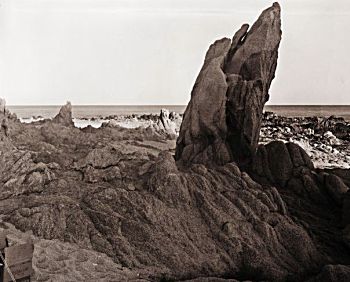 travel
Bradford Fuller
.....................................................
Hauling Sunrise Rim to Rim
From rim to rim, from beginning rim-arc all the way round, slowly, as slow as one wants life to be, when life is good, when life is good & slow, I saw it, limning, as if touching horizon, knowing full-well the bottom rim would show, exposing a small, expansive side & sections of the unverse to all privileged & alive who witnessed it. Taking a cue from Time's revoving illusion, apparent entropic ring, high C to gong, buoy bell to foghorn, steering my own directions down the street, wary & open to gargoyles' stare, pediments' plain enunciationm, hauling former sunrise rim to rim, becoming constant presence, an internal illumination guiding me throughout the day, as if reading in that immediately-etched memory, a navigational chart, the way the grey-hulled oil tanker, Acadian, lumbered out of port just now, heading north, all the way to Saint John.
.....................................................
Robert's work has been a daily part of my life for several years now. You can follow its continual unfolding at his log and may access a great deal of his online work here. Bent Sørensen on Robert Gibbons
a highly recommended profile and review
[Bent Sørensen blogs at A rare, rare find..., Ordinary finds and is also a contributor to america adrift: transatlantic perspectives on america]
Review of Robert Gibbons, Body of Time
Jim Feast
Poet Robert Gibbons's direct descendents of the senses
Alex Irvine .....................................................
Time on Water
a chapbook by Robert Gibbons
drunkenboat
Body of Time
Robert Gibbons
Beyond Time
Robert Gibbons
DeadDrunkDublin
with photography by Syrie Kovitz
_______________________
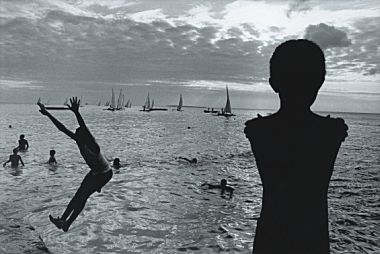
A child's dream of Africa
Zanzibar 1998
Luis Basto
Iluminando Vidas (Illuminated Lives)
A panorama of photographic work in post-colonial Mozambique
African imagery thanks to Jim Johnson
_______________________
no homeric echo here.
the legends knock on our doors when we need them.
no homeric echo of anything whatsoever...
here, a general is searching for a state that sleeps
under the rubble of a Troy that is yet to come.
Mahmud Darwish
extracts from Halât bisâr in Arabic and Etat de Siège (State of Siege)
translated from the French of Elias Sanbar's translation.
Pierre Joris
_______________________
The Literary Saloon, blog of the complete review, celebrates its sixth anniversary.
_______________________
Speculative Heresy
a website devoted to the exploration and discussion of the speculative heresies surrounding non-philosophy, speculative realism and transcendental materialism.
_______________________
The Aesthetics of the Fragment
I go for that, I told them in an essay: the notebook, fragment, random jotting. Not without purpose, not just anything, but the result of desire & impetus. Out here on the balcony with the dahlias having weathered wind, thunder, lightning, (they din't flinch), drinking rain in all night overnight, both pots growing from toddlers to adolescents in half a day. Keeping me company in lieu of any mail today. As they weathered the storm I thought about the thesis, the aesthetics of the fragment. It has a lot to do with our inate refusal to see any object in some way other than inherently whole, at the same time cultivating a fondness for that which is missing, that which is consubstatial to the ruin. Beyond Time: New and Selected Work 1977-2007
Robert Gibbons
_______________________
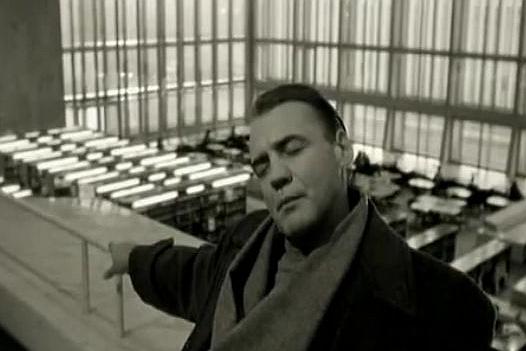
library
wings of desire

Grande Hotel
Beira, Mozambique
2008
Guy Tillim
michael stevenson
via Jörg Colberg
_______________________
A prayer and a poem
Mahmoud Darwish
openDemocracy
The Girl / The Scream
There is a girl on a sea shore
And the girl has a family
And the family has a house
And the house has two windows and a door.
And at sea there's a warship playing a game
of targeting those taking a stroll on the shore.
Four five seven drop to the sand.
The girl is spared by a sleeve of mist
a certain celestial sleeve came to rescue her.
She calls out: Dad, my Dad, let's go home, this sea is not for us.
And the father does not reply.
He lies there in an agony of absence, wrapped in his shadow in an agony of absence.
Blood in her palms blood in the clouds,
Her scream flies away with her far from the sea shore and higher.
She screams in the night of a wilderness
The echo has no echo
And the girl becomes the eternal scream of a breaking news event made obsolete by the planes return
to bomb a house with two windows and a door.
- Translation: Tania Nasir and John Berger
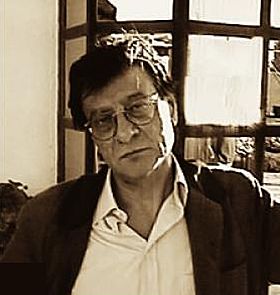
Mahmoud Darwish
13 March 1941 - 9 August 2008 Darwish poems
Mahmoud Darwish: The Expropriated Poet
Mahmoud Darwish: Palestine's Poet of Exile
Nathalie Handal
A Litany of Salaams
Philip Metres reviews Mahmoud Darwish's The Butterfly's Burden, translated by Fady Joudah
jacket .....................................................
In his Mural (2000), his book-long poem, Darwish says: “There’s no nation smaller than its poem.” And “The earth is a festival of losers, and we’re among them.” Something here echoes what Walcott said, perhaps: there is only poetry of defeat, no poetry (at least not one that’s worth it) of victory, at least in the contemporary world, beyond the archaic anthropologic heroism of Greeks and Trojans, tribes and Kings.
I don’t know what “political” poetry is, unless it is “bad” poetry, propagandist or apologist for injustice. Other than that, it is not “political,” rather it is dignified, humanizing. I don’t feel a “responsibility” to write political poems, I feel a compulsion to address that line where the universal is the personal and the personal, the universal. Being Palestinian almost becomes another’s question of me, and certainly not mine of myself. That question is in many ways one of power, of rewriting “the other.” Thus, what is called “political” poetry, for me, is to humanize the other without stripping them from the right to speak their narrative, or imposing on them my narcissistic projections as righteous poet.
- Fady Joudah
_______________________

Qsar El Saràb: the Citadel
desert archeologies
Thierry Urbain
_______________________
On Harmony
A Theory of Translation
Serge Gavronsky
drunken boat
Let me go back historically to the beginning of the beginning to see to what extent this play with metaphor leads to a contemporary reflection on textuality and its specificity, or, in fact, irreducibility: "Yes, Virginia, the ‘original does indeed exist!"
"In the beginning was the word…" So saith the King James version and certainly not the French, which plays on logos. But in the vicinity there appears a Mallarméan tribe or clan with other thoughts on the matter. In our mythic constructs, we have always considered the Tower of Babel as a sign of untoward arrogance, in fact, a disputatious act of such pith that God himself not only struck the tower down but eternally punished that clan by multiplying the communication codes to such an extent that henceforth men would no longer be able to understand each other. This mytheme seems to me to be in need of corrective surgery. In my interpretation, something totally antithetical occurred at that moment: that is, as the Bible indicates, the bricks that were used, I suppose, were books (and here I play, innocently enough, perhaps with a touch of naïveté, with the indisputable alliterative and non-translatable function of langue versus langage, that is, with the literality of the text…)
What are we told about this clan apparently wishing to rival God’s creation? Well, that they could indeed communicate, but that their words were poor. An utilitarian order reigned, thereby forbidding those men from developing a … literature. The original punishment was an apparent universal interdict. Man’s fate, as the Bible records it, is, however paradoxical it may appear, to bestow on himself and on his descendents the greatest gift that was ever invented: the multiplication of literary texts. And thus from Babel to the Hanging Gardens of Babylon, Biblos becomes the true threat to God’s hegemony.
In this Edenic library, there is one serpent we can name quite quickly: the translator, for he or she is simultaneously able to go in the direction of "right" conduct or, like the worm, eat the word from inside without anyone knowing it, at least not upon first reading. Treason in translation I would suggest is man’s supreme self-mutilation since it prohibits his kind from enriching itself through the transference of texts otherwise remaining illegible. ...(more)
_______________________
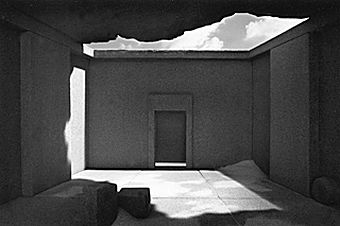
Salle des Transformations
desert archeologies
Thierry Urbain
_______________________
Blind Patriotism
McCain is Counting On It
Rev. William E. Alberts
“America is the greatest nation in the world,” and has a divine mission to spread its God-given “freedom and democracy to the darkest corners of the world.” Rubber stamp these beliefs with “God bless America” and the ethnocentric and imperialistic masquerade is complete. Such is the blind patriotism driving much of the 2008 presidential campaign. A self-deceiving and potentially self-destructive patriotism that threatens the very security of America.
Enter Republican presidential candidate Senator John McCain.(....)
As the hymn goes, “Onward, Christian soldiers! Marching as to war, With the cross of Jesus Going on before.” Blind faith prostituting the cross by turning it from a symbol of Jewish liberation from Roman occupation into a symbol of Christian conquest and conversion. Blind faith and blind patriotism: two sides of the same ethnocentric/imperialistic coin.(....)
Senator McCain’s military experience no more qualifies him to be “commander-in-chief” than a chronic heart patient’s experience qualifies him to be a cardiac surgeon.
It is not about believing is seeing but about seeing and doing “self-evident” truths. It is not just about “the land of the free and the home of the brave,” but about a country founded and built on the bones of Native Americans and the backs of enslaved Africans. It is not about allegiance to a nation but about a nation’s allegiance to “liberty and justice for all” everywhere. It is not about “God bless America” but about America blessing all of its citizens “from sea to shining sea.” It is not about “America is the greatest nation in the world,” but about the world in which everyone is great. It is about everyone’s right to see for himself and herself....(more)
_______________________
Resisting Panic, Resisting Forgetting
Alejandro de Acosta
Perspectives on Anarchist Theory
Resisting forgetting and resisting panic. In both cases it’s about maintaining our priorities as anarchists or anti-authoritarian thinkers and activists. It is a matter of living in resistance to the nation and the state; not confusing its priorities with ours. As always, this is a matter of resisting the spread of fear that comes from both directions – the state’s war machine, and the terroristic war machine that has perhaps escaped the state, but which bears the marks of its contact with the state. It is also a matter of making our non-allegiance to those entities or processes visible, communicable, public: on the air, in the street, in any space that opens or is opened for political discussions.
In this time of shutting down of political pluralism, in this time of the apparent vanishing of all religions except dueling monotheisms, it seems ever more important to insist on other politics, other religions, other cultures, and other ways of life, which continue to struggle and resist as living alternatives. In so far as we live these alternatives, or can communicate with them (though there is nothing easy about this communication), we resist the flows of stupidity that the state relies on for its distribution of sadness and identities. When I move in public, I try to embody this pluralistic outlook. That it has become more difficult does not make me want to do it any less – to the contrary. ...(more)
_______________________
Memory, History, Forgiveness: [PDF]
A Dialogue Between Paul Ricoeur and Sorin Antohi
translated and annotated by Gil Anidjar
janus head
_______________________

Petros Village, Malawi
Guy Tillim
2006
_______________________
The Shadow
Mahmoud Darwish
translated by Fady Joudah
The shadow, neither male nor female,
ashen, even if I set it on fire . . .
It follows me, it grows then shrinks.
I was walking. It was walking.
I sat. It sat.
I ran. It ran.
I said: Let me trick it and take off my kohl coat,
it copied me and took off its ashen coat . . .
I turned onto the side road
it turned onto the side road.
I said: Let me trick it and walk out of my city’s sunset
then I saw it walking ahead of me
into the sunset of another city . . .
I said: I’ll come back leaning on two crutches
then it returned leaning on two crutches
so I said: I’ll carry it on my shoulders,
but it resisted . . .
I said: Then, I’ll follow it to deceive it.
I’ll follow this parrot of shapes and mock it
copying what copies me
for the like to stumble on the like
and I would not see it, nor it see me.
Studio
_______________________
 Library, Babylon
desert archeologies
Thierry Urbain
_______________________
Edward Said: A Contrapuntal Reading
Mahmoud Darwish
New York/ November/ Fifth Avenue
The sun a plate of shredded metal
I asked myself, estranged in the shadow:
Is it Babel or Sodom?
***
There, on the doorstep of an electric abyss,
high as the sky, I met Edward,
thirty years ago,
time was less wild then...
We both said:
If the past is only an experience,
make of the future a meaning and a vision.
Let us go,
Let us go into tomorrow trusting
the candor of imagination and the miracle of grass/
...(more)
thanks to Cassandra Pages
_______________________
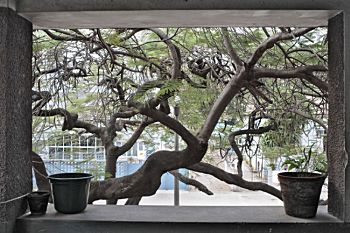
Maputo, Mozambique
Guy Tillim
2007
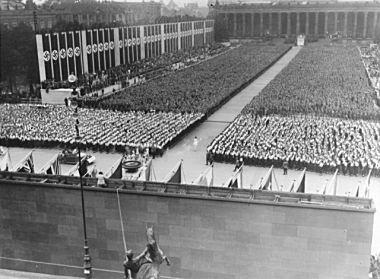
Olympics, Berlin 1936
_______________________
Looking Away from Beauty
What remains hidden behind the nationalism of the Olympic Games
Rebecca Solnit
orion
The athletes’ bodies are relentlessly particular, concrete, personal, and tangible: the reality of flesh, of heart, of effort, of this tense face, that muscled arm, that DNA, and that training and determination. This is why it’s so peculiar that the Olympics suspend these bodies in an abstracted superstructure of nationalism, as though this feat of balance really had something to do with Austria, that burst of power really represented Japan.(....)
Bodies in peak condition performing with everything they’ve got are an image of freedom, as are pristine landscapes like Yosemite and the Tetons. But the reality of freedom only exists when these phenomena aren’t deployed to cover up other bodies that are cringing, starving, bleeding, or dying, other places that are clearcut, strip-mined, and contaminated. Television coverage of the summer Olympics probably won’t cut away from those sleek athletes to the charred bodies of massacred villagers and the anguished faces of young gang-rape victims in Darfur, or the bloodied heads of young monks and uncounted corpses and prisoners in Burma and Tibet. But the associations between the two are crucial to our sense of compassion, and of what it means to be a part of a global community. ...(more) thanks to Jim Johnson
_______________________
from
Colors & Figures
Laura Carter
A soldier &
a parcel-parrot: a new thrill.
A fossil of a path. A chemical in the sky.
“Exchange love for love,” the book says.
Living agriculture,
the conquest of the camera.
Net of holy desires—
fall into relation.
...(more)
Laura's new blog - love and coffee
_______________________
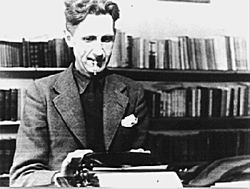
_______________________
George Orwell blogs
From 9th August 2008, you will be able to gather your own impression of Orwell's face from reading his most strongly individual piece of writing: his diaries. The Orwell Prize is delighted to announce that, to mark the 70th anniversary of the diaries, each diary entry will be published on this blog exactly seventy years after it was written, allowing you to follow Orwell's recuperation in Morocco, his return to the UK, and his opinions on the descent of Europe into war in real time. The diaries end in 1942, three years into the conflict.
_______________________
Somatosphere
A collaborative weblog covering the intersections of medical anthropology, science and technology studies, cultural psychiatry and bioethics.
via Savage Minds
_______________________
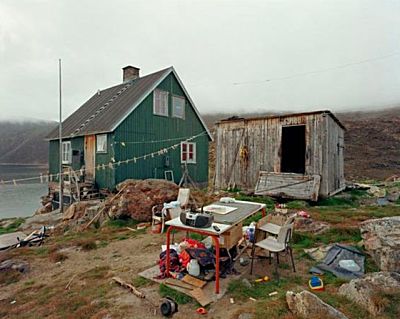
Broken Line
Olaf Otto Becker
text by Tim Clark
1000 Words Photography Magazine
via We Can't Paint Blog Olaf Otto Becker
_______________________
I have always had such a dread of the present and of the real in my life that I have never represented in art a painful or delightful emotion while I was experiencing it, but have attempted instead to flee to the sky of poetry from that land whose brambles have, at every step, lacerated feet too fragile and perhaps too ready to bleed....
Thus I always carried within me the memory of times that I had not seen, and the discontented experience of old age entered into my child's mind and filled it with mistrust and a precocious misanthropy.
- Alfred de Vigny, Journal Waggish
_______________________
Flooding the Border with Security Preserves
Bryan Finoki
Subtopia
It certainly isn’t new to discuss anything these days in terms of fluidity and flow, perhaps least of all global migration. From academic daydreamers intoxicated with Deleuze to mundane AP writers simply reporting the news, the floods of migrants, the deluge of border crossers, and the waves of refugees, seem like common phrases in most of the discourse on migration. It’s almost the vernacular it seems to compare the movements of refugees to oceanic tides, or, chaotic rivers, desperate inundations, masses crashing on the shores of statehood’s rejection, seeping past the gates towards the doorsteps of a surrogate homeland. Just as unstagnant water exists in a state of constant motion, human migration, too, presses on in its own state of permanent unsettlement, in its own form of hyper-alluviality, I suppose, wandering in all directions and dimensions – like global capital personified, or something.
Migration, as a space, could be viewed as a kind of restricted amorphousness, at times sprawling and others dammed, refunneled, overflowing, boring under the earth, tendriled and uncontained, evaporative, invisible. The refugee is bound in perpetuity between here and there, place and non-place, legal and illegal, formal and informal, stable and destable, entitlement and undocumented, inclusion and exile – politically speaking, maybe a state of non-being....(more)
_______________________
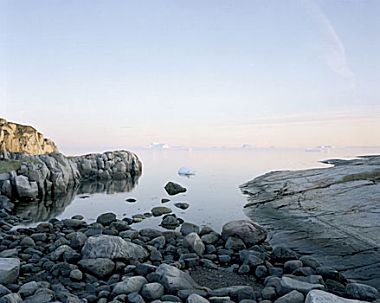
Olaf Otto Becker _______________________
The False Gospel of Work
Against the cant of diligence and virtue.
Eugene McCarraher
...Carlyle continued to bless the sweat of Adam's curse as the beads of beatitude. A little later, in his "Occasional Discourse on the Negro Question," Carlyle recounted the character-building benefits of African enslavement with a sanctimonious sadism worthy of Christian Reconstructionists. Behind the racism lay the Gospel of Work, now preached with the brutal eloquence of the whip. "If it be his own indolence" that prevents a man from his "sacred appointment, to labor while he lives on earth," then, Carlyle pronounced, every "wiser, more industrious person" had a duty to " 'emancipate' him from his indolence." (Arbeit macht frei, as a later generation of the Wise and Industrious would put it.) The man who dubbed economics the dismal science was certainly a piece of work.
But such has been the cant of diligence and virtue from the Pharoahs to David Brooks, our suburban Hesiod, who tells us the current bourgeois ethic is "sweeter, and more optimistic" than its dour Puritan ancestor. Though instructed no longer in the ways of probity inscribed in McGuffey's Reader, Americans still know the proverbs of exertion passed down by Puritan divines: "An idle mind is the Devil's workshop"; "Satan always finds mischief for idle hands to do." These belabored mites of deception comprise the sentimentality of avarice, and the most eloquent refutation they merit is our yawning, carnal repose. Besides, the Devil's workshops are now located in the world's burgeoning slums, and Satan outsources his mischief to factories and offices around the planet. Thankful for the competitive edge bestowed by global capitalism, Lucifer now finds plenty of work for busy hands to do.(...)
So close the book on Steven Covey and those Seven Habits of Highly Effective People; spread the good news of Wallace Stevens and "the pleasures of merely circulating." ...Draped in the sober raiment of industry, the Work Ethic's boss is Mammon, a deity more demanding and less forgiving than the God who adorns the idle....(more)
_______________________
oasis
Barbara Mor
ctheory
All moist life is inside now. Dark oases of banks, hotels, restaurants, avid hearts. Valves open, glass doors sluice heavily inward all hours day and night vegetal interiors -- we are consumers. Sudden biologic air light water. Tendrils of machinery alleviate the body, green plants florescent
liquids circuitries of oxygen nutrients through skins of semi- human buildings, tubes wires electric cells inside walls pump what is left of earth from a deep place into our veins. From the ice of mental systems into our final thoughts
Terrariums, aquarium fish enjoy the same ambience (if plunged in a desert of fire, enact careers on the surface of Mars). This is how it feels.
Clocks, all coordinates of time and space intersections of philosophy metallurgy famine sex become this place. Watery exchanges of money, historic lips hands palms genital intellect and soft pulses of bodies doing business. Little sweats of laughter. Your interchangeable face
Almost among rainforest of planters wooden boxes automatic drip salad bars, euphoric negative ions stainless coffee coca chrome. Something feeds, that mysterious gut. Deliver us, from thirst from depths complex artificial suckt and pumped Inside terminal flesh; breathe see swallow urine spit shit (even us).
This is how bodies are kept alive ...(more)
_______________________
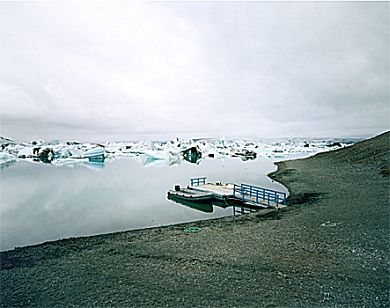
Olaf Otto Becker
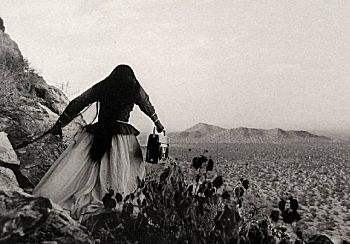 Mujer Angel, Sonora Desert
Graciela Iturbide
1979
1 2 3 4 5 thanks to Heading East
_______________________
from
Pastoral
Louise Glück
The sun rises over the mountain.
Sometimes there's mist
but the sun's behind it always
and the mist isn't equal to it.
The sun burns its way through,
like the mind defeating stupidity.
When the mist clears, you see the meadow.
No one really understands
the savagery of this place,
the way it kills people for no reason,
just to keep in practice.
So people flee—and for awhile, away from here,
they're exuberant, surrounded by so many choices—
But no signal from earth
will ever reach the sun. Thrash
against that fact, you are lost.
...(more)
The Threepenny Review
_______________________
Giorgio Agamben and the community without identity
René ten Bos
download link
Introduction
The Italian philosopher and philologist Giorgio Agamben has been on the scene now for more than twenty years, even though most of his work has only been available in English for a decade or so. Perhaps, it might strike you, the reader, as somewhat strange to have a thinker like Agamben in a book on theorists of organization. While it is true that his work is characterized by a profound interest in human beings, which is, I believe, how most organizational scholars would characterize themselves as well, the kind of human beings portrayed by Agamben are probably not the kind of human beings you are likely to encounter in and around organizations (managers, shareholders, workers, and so on). On the contrary, Agamben’s work seems to focus on those who are, for many different reasons, excluded from these seemingly well-ordered places. If, for a single moment, Agamben does seem to speak about people working in organizations, then his attention will always be rapidly diverted towards those who have, for reasons that must remain obscure for all the people who continue doing their jobs, stopped working – as is the case, for example, in his splendid analysis of Melville’s short story about a scrivener called Bartleby. The truth about human beings, Agamben seems to suggest, is, if anywhere, surely not to be found in organizations that put people to work.via Pro-logus
Bartleby, the Scrivener: A Story of Wall-street
Herman Melville
1853
_______________________
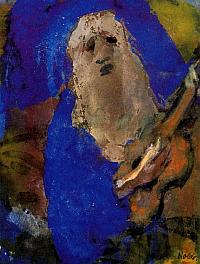
Hoary Old Man Singing
Emil Nolde
b. August 7, 1867
_______________________
Tell them I'm struggling to sing with angels who hint at it in
black words printed on old paper gold-edged by time.
Tell them I wrestle the mirror every morning.
Tell them I sit here invisible in space; nose running, coffee cold
& bitter.
Tell them I tell them everything & everything is never enough.
Tell them I'm davening & voices rise up from within to startle
children.
Tell them I walk off into the woods to sing.
Tell them I sing loudest next to waterfalls.
Tell them the books get fewer, words go deeper, some take
months to get through.
Tell them there are moments when it's all perfect; above & be-
low, it's perfect, even in moments in between where sparks in
space (terrible, beautiful sparks in space) are merely metaphors
for the void between one pore & another.
- David Meltzer
quoted here [PDF]
.....................................................
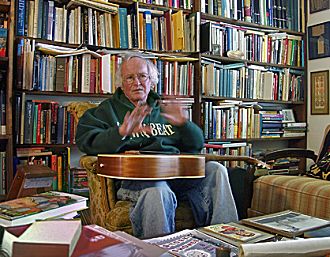
David Meltzer
photo - Larry Keenan
Family Photos: Beats In Winter
Larry Keenan
Big Bridge
from
BARK:
A Polemic
David Meltzer
It's what they teach in school.
Go for the throat.
If it moves, attack.
Mrs Callahan in 6th Grade said
To get ahead you gotta be a headhunter.
Shrink knowledge into know-how.
No difference between smart ones or dumb ones.
Everyone's called asshole.
We learn after a while of it
How dangerous mind is.
A mine-field. Tread easy.
Minding the store is easy.
Not caring for any of it is hard,
Cracks shields.
Your flags & faces crash to the floor.
You gotta remember
It's the Ship of State that's carrying us away.
Not the people jumping off.
...(more)
Light & Dust Anthology of Poetry
_______________________
Capitalism eliminates shame in certain ways. It doesn't need shame, it's not particularly useful. You could be someone who spends every evening nailing their cock to a pigeon and as long as you turned up to work and bought consumer goods from time to time, you'd be fine. This 'permanent undercurrent of debilitating anxiety' that characterises the CVification of everything means that one must turn everything into a selling-point. Capitalism may eventually eradicate most forms of traditional sexual difference, but it'll do so at the cost of all human capacity. infinite thØught responds to Curriculum mortis
you're like an advert for yourself!
_______________________
Precarity explained to kids (a medley)
Cut, Pasted and Articulated (somewhat) by Aviv Kruglanski
The Journal of Aesthetics & Protest
_______________________
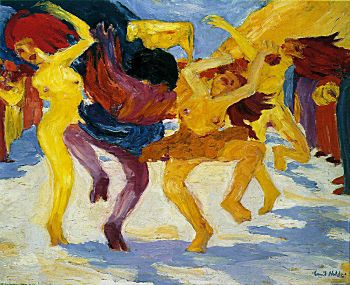 dancing around the golden calf
Emil Nolde
_______________________
Identi.ca
Although Identi.ca isn’t even close to having the number of users that Twitter has, it is open source and you can take your data with you. This means that you can start your own Identi.ca server and take control of your account. While Twitter holds your account hostage on its unreliable network, the distributed and decentralized approach that Identi.ca takes frees up everything, and with some further expected developments, the service could turn into something special.
- Brandon Watts
_______________________
The Future of Newspapers and Litblogs: A Thought Experiment
Edward Champion, responding to Lissa Warren: Will Blogs Save Books?
Warren’s complaints about litblogs fall into the same tired explanations that have been bandied about by the likes of Sven Birkerts, Michael Dirda, and numerous other myopists who are incapable of accepting an alternative that has been carrying on for a good five years. The objections are less about function, or even the content (conveniently, examples of the litblogs’s inadequacies are never cited by the naysayers), and more about form and especially control.
The print boosters remain hostile to the idea that an online medium can not only modify the manner in which critics and readers approach a book, but generate innovative methods of expanding one’s relationship to a text. So litblogs are deemed inferior not necessarily because the content is inferior, but because there are doubts about the methods and manner in which litblogs transmit information....(more)
Print v. blogs discussion
the Literary Saloon _______________________
Is Poetry a Technology?
K. Silem Mohammad
...when poetry puts on technological goggles and overalls, it does so ultimately to highlight its intrinsic incompatibility with the overarching agenda of modern technology--its capacity, perhaps, for "enframing" us all as a standing reserve of resources. This is in a sense yet another variation on the old "poetry makes nothing happen, and that's what's good about it" position. I'm tempted to push back further into history and suggest that poetry has also always had this relationship to philosophy, albeit in a necessarily subtler form....(more)
_______________________
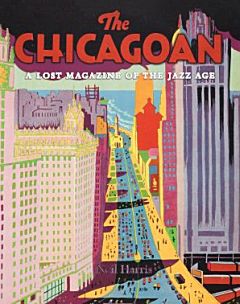
The Chicagoan
A Lost Magazine of the Jazz Age
Neil Harris
With the assistance of Teri J. Edelstein
forthcoming from University of Chicago Press
_______________________
The Persistence of Ectoplasm
Michael Rothenberg
Let me touch you there blue warbler
Something to beware of coming under-wing
That cage and mirror, cuttlebone maze
Fast approaching end of free days
I heard the hole in the ground, slit drum sing:
“Where is the real bird, real song, the real?”
In the mirror reading each line backwards
I thought I thought I was never afraid, or blush
Hunters come to lock the day in a library
Ink-stained thumbs, permission clipped tongue
Peace be with you naked in razorwire thornbush
Transcendent in being, let it rain, but if it die
The blood orange, strawberry stain
If not for that I’d be ashamed of speech
What’s your name darling? Verse! Peach
Outcome of fleshlight falling midnight moon
Written in sand, hand-written, tidal wave
Remains tattooed to memory, a wind birth
Archipelago
_______________________
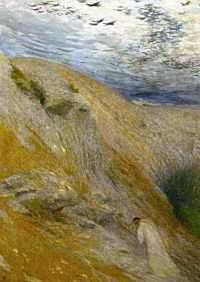 Orpheus Realizing the Loss of Eurydice
Henri Eugene Augustin Le Sidaner
1900

Gent
1958
Hugo Claus
Beeldbank Amsterdam
_______________________
Waiting For The Prince -
an interview with Béla Tarr
Storyboards are stupid, stupid things. No, we never use the script. We just write it for the foundations and the producers and we use it when looking for the money. The pre-production is a very simple thing. It takes always a minimum of one year. We spend a year looking all around and we see everything. We have a story but I think the story is only a little part of the whole movie. I have to tell you I absolutely hate the movies that I can watch at the theatres. They are like comics. They always tell the same stories. We don't like these stories because for us every story is always the same old story from the Old Testament. After the Old Testament we have no new stories. We have no news. If you want some news you can watch it on the TV or read it in the newspaper. But movie stories are not new and that's the reason why we think "okay, the story's only a part of the movie because the other things, time, rhythm, noises and."via Spurious
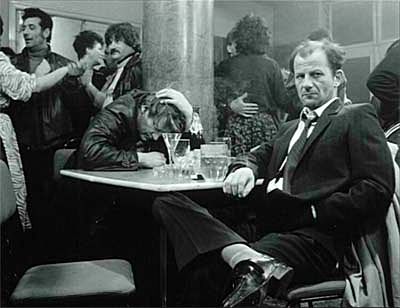
Damnation
Béla Tar on Youtube
This is probably the only thing that's still genuine - time itself: the years, days hours, minutes and seconds. And film time has also ceased to exist, since the film itself has ceased to exist. Luckily there is no authentic form or current fashion. Some kind of massive introversion, a searching of our own souls can help ease the situation.
Or kill us.
Béla Tarr
_______________________
Curriculum mortis
Savonarola
Institute for Conjunctural Research
One of the more pervasive phenomena in the current cod-neoliberal academic dispensation is CV inflation: as available jobs dwindle down to Kafkian levels of postponement and implausibility, the miserable Träger of academic capital are obliged not just to overfulfil the plan, but to record - with the exacting eye of a Big Other meting out his next-to-last judgment - every single one of their productive acts.(....)
As Lyotard presciently noted in Libidinal Economy (courtesy of No Useless Leniency):
Are we, intellectual sirs, not actively or passively 'producing' more and more words, more books, more articles, ceaselessly refilling the pot-boiler of speech, gorging ourselves on it rather, seizing books and 'experiences', to metamorphose them as quickly as possible into other words, plugging us in here, being plugged in there, just like Mina on her blue squared oilcloth, extending the marker and the trade in words of course, but also multiplying the chances of jouissance, scraping up intensities wherever possible, and never being sufficiently dead, for we too are required to go from the forty to the hundred a day, and we will never play the whore enough, we will never be dead enough.
...(more)
_______________________
Blanchot l'extrême
Philippe Sollers
Translated: Sollers on Blanchot
Lauren Elkin
We do not know enough, in our low culture of forgetting, to what extent Maurice Blanchot (1907-2003) was, from the shadows, one of the most influential writers of the 20th century. We find traces of his austere and corrosive influence everywhere-- at the NRF, the Editions de Minuit, in spellbound philosophers (Foucault, Derrida), in the very perception of literature as subversive force that Mallarmé called "restrained action." Remember: this was still the era of the "great silence", of writers that we never saw in the media circus (no television, no radio, no photographs no interviews, no PR firms), nothing but books. These masters of the background included Breton, Char, Gracq, Beckett, Cioran, Michaux, Debord.
Vice loves to celebrate virtue: all these monks of the greatest asceticism had, therefore, little by little, an excellent reputation.
via Stephen Mitchelmore
_______________________
Solzhenitsyn and the right
lenin
...his usefulness to the American empire was limited, and definitively reached its sell-by date by 1990. Neoconservatives might have appreciated his critic of the degeneracy of the West and its failure to defend itself by being more God-fearing, but he was a Russian nationalist and this stance made him unpopular with some of Reagan's advisors, who presumably hoped to turn the country into an IMF basket-case. In fact, his argument against communism was by no means a defense of liberal universalism. Instead, he appealled to Americans to understand the 'West' as a distinct cultural entity which, while it had to be defended both against its communist opponents and its internal decadence, had little applicability to other societies. He wrote to Reagan to explain that once the putative threat from the USSR had gone, the US should pull out of every country it was involved in, from Central America to Africa to South-East Asia, and leave the world to its own devices. Once he was able to return to Russia in 1990, his austere conservative criticisms of the decadence of Western society, long articulated but generally glossed over by his supporters, came to the fore. He became rather unfashionable at this point. By the time he was castigating US military interventions in Yugoslavia, Afghanistan and Iraq, and defending the Putin administration, the American right had no more use for him.
Even so, reactionaries will surely find it in their hearts to forgive his later meanderings and remember instead the bold anticommunist who defended NATO's favourite fascist, worked to undermine detente, attacked the antiwar movement, and generally called for America to be far more aggressive than it was even prepared to be....(more)
_______________________
A Thousand Plateaus
capitalism and schizophrenia
Deleuze / Guattari
translated by Brian Massumi
pdf here
via Continental Philosophy
A book has neither object nor subject; it is made of variously formed matters, and very different dates and speeds. To attribute the book to a subject is to overlook this working of matters, and the exteriority of their relations. It is to fabricate a beneficent God to explain geological movements. In a book, as in all things, there are lines of articulation or segmentarity, strata and territories; but also lines of flight, movements of deterritorialization and destratification. Comparative rates of flow on these lines produce phenomena of relative slowness and viscosity, or, on the contrary, of acceleration and rupture. All this, lines and measurable speeds, constitutes an assemblage. A book is an assemblage of this kind, and as such is unattributable. It is a multiplicity—but we don't know yet what the multiple entails when it is no longer attributed, that is, after it has been elevated to the status of a substantive.(....)A first type of book is the root-book. The tree is already the image of the world, or the root the image of the world-tree. This is the classical book, as noble, signifying, and subjective organic interiority (the strata of the book). The book imitates the world, as art imitates nature: by procedures specific to it that accomplish what nature cannot or can no longer do. The law of the book is the law of reflection, the One that becomes two. How could the law of the book reside in nature, when it is what presides over the very division between world and book, nature and art? One becomes two: whenever we encounter this formula, even stated strategically by Mao or understood in the most "dialectical" way possible, what we have before us is the most classical and well reflected, oldest, and weariest kind of thought. Nature doesn't work that way: in nature, roots are taproots with a more multiple, lateral, and circular system of ramification, rather than a dichotomous one. Thought lags behind nature. Even the book as a natural reality is a taproot, with its pivotal spine and surrounding leaves. But the book as a spiritual reality, the Tree or Root as an image, endlessly develops the law of the One that becomes two, then of the two that become four. . . Binary logic is the spiritual reality of the root-tree. Even a discipline as "advanced" as linguistics retains the root-tree as its fundamental image, and thus remains wedded to classical reflection (for example, Chomsky and his grammatical trees, which begin at a point S and proceed by dichotomy). This is as much as to say that this system of thought has never reached an understanding of multiplicity: in order to arrive at two following a spiritual method it must assume a strong principal unity. On the side of the object, it is no doubt possible, following the natural method, to go directly from One to three, four, or five, but only if there is a strong principal unity available, that of the pivotal taproot supporting the secondary roots. That doesn't get us very far. The binary logic of dichotomy has simply been replaced by biunivocal relationships between successive circles. The pivotal taproot provides no better understanding of multiplicity than the dichotomous root. One operates in the object, the other in the subject. Binary logic and biunivocal relationships still dominate psychoanalysis (the tree of delusion in the Freudian interpretation of Schreber's case), linguistics, structuralism, and even information science.
The radicle-system, or fascicular root, is the second figure of the book, to which our modernity pays willing allegiance. This time, the principal root has aborted, or its tip has been destroyed; an immediate, indefinite multiplicity of secondary roots grafts onto it and undergoes a flourishing development. This time, natural reality is what aborts the principal root, but the root's unity subsists, as past or yet to come, as possible. We must ask
if reflexive, spiritual reality does not compensate for this state of things by demanding an even more comprehensive secret unity, or a more extensive totality.
_______________________
Anti-Oedipus
Caitalism and Schizophrenia
Gilles Deleuze and Félix Guattari
Translated by Robert Hutley, Mark Seem and Helen R. Lane
pdf here
_______________________
Follow This Dime
Why Misgovernment Was No Accident in George W. Bush's Washington
Thomas Frank
Fantastic misgovernment of the kind we have seen is not an accident, nor is it the work of a few bad individuals. It is the consequence of triumph by a particular philosophy of government, by a movement that understands the liberal state as a perversion and considers the market the ideal nexus of human society. This movement is friendly to industry not just by force of campaign contributions but by conviction; it believes in entrepreneurship not merely in commerce but in politics; and the inevitable results of its ascendance are, first, the capture of the state by business and, second, all that follows: incompetence, graft, and all the other wretched flotsam that we've come to expect from Washington.
The conservatism that speaks to us through its actions in Washington is institutionally opposed to those baseline good intentions we learned about in elementary school.
Its leaders laugh off the idea of the public interest as airy-fairy nonsense; they caution against bringing top-notch talent into government service; they declare war on public workers. They have made a cult of outsourcing and privatizing, they have wrecked established federal operations because they disagree with them, and they have deliberately piled up an Everest of debt in order to force the government into crisis. The ruination they have wrought has been thorough; it has been a professional job. Repairing it will require years of political action....(more)
_______________________

On a Bridge in Abramtsevo
1879
Ilya Repin
b. 5 August 1844
_______________________
A Ten Hut!
John Latta
Recitativo In Aspic
The antirrhinum’s a flower, malleable and porous, “gubber’d and gravid” one longs to say, seeing the tubby bee so gracelessly butting at its fatty “lips” (yellow’d thighs fatted up like a varsity member’s): genus of the snapdragons. I read it in a book sodden with words. Or “sudden.” Effigies of things that bend out under that naming, just as the snapdragon bends out under electrical wires running off a pole twined about by trumpet flowers where hummingbirds hang in the air buzzing like “molecular models atomic,” the kind of syntactical rip-rap Milton’d laid down had that particular (scientific) vernacular got dispatch’d “then.” They are poking long bills into the tubular orange flowers. “Long bills tubular.”
There’s a new spirit raking through
these marble ruins like a mistral, it’s making
us snap our nerve ends cat-o’-nine-tails-ishly
against one another’s imponderable
lack of grace, grace never holds up under
scrutiny. More strange is the dilute way
the roseate afflatus that is the sun balling
down into the ocean out beyond
the columns tints everything with the rinse
and patina of its sinking, mournful
and magnificent like a big horse dying in battle.
The pain is impersonal and abrupt,
I know no better words for it.
Cold breezes rake one’s neck.
...(more)
_______________________
Hero Of The Local: Robert Creeley And The Persistence Of American Poetry
Charles Bernstein
Sibila
_______________________
The Renaissance Of 1910
Reflections on Guy Davenport’s Poetics
Marjorie Perloff
Again and again, in the essays collected in The Geography of the Imagination (1981), Guy Davenport refers to a “renaissance” taking place “around 1910". The clearest statement comes in the essay called "Narrative Tone and Form", reprinted from the Guy Davenport-Ronald Johnson issue (1976) of Vort, that remarkable journal founded and edited by Barry Alpert. Davenport writes:
Our age is unlike any other in that its greatest works of art were constructed in one spirit and received in another.
_______________________
lots of new poetry at nthposition
_______________________

photographs of Albert Einstein
Lotte Jacobi
Princeton University
Lotte Jacobi’s Historical Portraiture
Lynne Eodice
Shutterbug
The Lotte Jacobi Collection
The University of New Hampshire

summit of Stevens Pass
1926
Lee Pickett Photographs
_______________________
A Passion for Waiting:
Walter Benjamin in the Cafés
Gray Kochhar-Lindgren
Again and again throughout our lives we are guided through passageways to certain types of people until everything contracts to a figure, a symbol. But the configuration of the labyrinth began long before, in the early days of his young adulthood, when he first becomes an initiate into the life of Orpheus. Wandering into the Viktoria Café and the West End Café he admitted that, at the time, he did not yet possess the passion for waiting without which one cannot thoroughly appreciate the charm of a café.(....)
By returning time and again to the same site, by meticulously working our way down through the layers of sediment and brushing off the remains with our dental picks and toothbrushes, we are able to discover the real treasure hidden within the earth: the images, severed from all earlier associations, that stand—like precious fragments or torsos in a collector’s gallery—in the prosaic rooms of our later understanding. And, as important as it is to preserve an “inventory” of our discoveries—to make a list for our bosses and those who are to come—the essential thing is to know the “dark joy of the place of the finding itself.” ...(more)
The Café Irreal, issue 27via Ordinary finds
_______________________
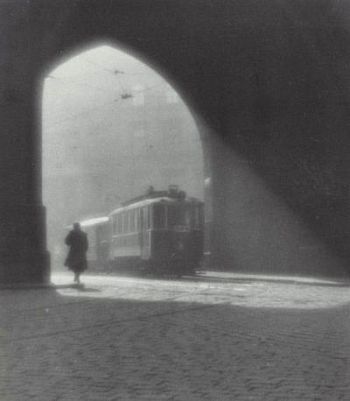
Morning Trolley
(Prague)
Josef Sudek
1924
_______________________
The Influience of Anxiety: Writings on Psychiatry
Words Without Borders
A Weeknight Before the Turn of the Century
Klas Östergren
Translated from the Swedish by Tiina Nunnally
Previously, in other accounts, I've described how a person undergoing a serious crisis can lie on his sickbed and attempt, in a tragicomic way, to formulate his last words, to pay attention to his thoughts as if they were actually his very last. Testimonials regarding this condition may reveal a fatal lack of both genius and originality. You start humming old pop tunes, just bits and pieces, a few verses from pointless refrains that have lodged in your memory and now churn away like an incantation, a litany of rhyming words whose sole purpose is to keep out all other thoughts, notions that may end up signifying something frightening, a terrible insight. In my case it was an old American song that came to mind, a song called "Is That All There Is?" The question wasn't entirely misplaced, since it was exactly what I kept confronting: Was this anxiety the only thing I had to offer, the only thing that seemed absolute and irrefutable? For quite a number of people anxiety is the strongest and only truly unambiguous feeling that exists, the only sensation that can't be questioned or trivialized. It cannot be replaced with something else, nor can it be mastered in some way. It's not a very pretty summation of a life.
"Is that all there is?" I'd rather leave that honor to somebody else.(....)
The person who has once lost everything in his life—or, if that sounds too drastic, has at least lost his foothold—knows that in the end he loses his fear as well. It clings to the objects that are carried out the door, by a wife or an evicting sheriff; and in the end, when only emptiness remains, that person is also free of the terror to which he has grown accustomed and has taken for granted. When that is gone, something remains which, for lack of a better word, might be called courage. He is ready to make decisions.
Most people know what hesitation, anguish, and indecision mean—it's the torment that keeps you awake at night before having to take a stand on something. You weigh the pros and cons, and if they balance out, the matter is even more difficult, but in the end you have to make a decision in order to move on. Yet certain decisions require greater courage and greater perspicacity than others, since the outcome may have a direct impact on the rest of a person's life.
"Is that all there is?" Attacks of anxiety can leave you completely exhausted, squeezed dry, and scared out of your wits—ready to go along with anything at all, submit to any sort of agreement, if only you'll be released from this hell. So the answer often appears quite apparent, but most people refuse to give up. There are always a few more stones to turn over....(more)
_______________________

Prague bridges
Czech transport
_______________________
City of Bridges
Rebecca Hall
agni
I fear bridges. Gephyrophobia. My therapist said that I fear change, fear moving forward. This fear is common, he said. But it’s not the opposite side that scares me, I told him. It’s the middle. My therapist shifted in his chair. You’re walking across a bridge, he said. Are you with me? The Aurora bridge tilted upward like an off-kilter aqueduct in a dream. Yes, I replied. How does it feel, he asked. I closed my eyes, watched gray, billowing sky drop from above like a velvety stretch of river-wide curtain. My lungs groped at the air, pantomimed claustrophobia. I feel trapped, I said. There’s nowhere to go. My therapist nodded. He rested his chin in his hands. Do you think about death, he asked.
I’ve been wandering since daybreak. I’m in the heart of Prague on an island, Strelecky Ostrov, which floats in the Vlatva like a heart in flesh. Marksmen’s Island. If I look sideways, I can see the Charles Bridge. Sooty statues guard its stone rail. Earlier in the day, I crossed the bridge. The statues were closer to the edge than I was, someone to talk to if I lost my balance. Their carved stone hands looked nice to hold....(more)
_______________________

Charles Bridge
Scott Thompson
misplacedpixel
_______________________
also at Words Without Borders
Esterházy Per Se: A Translator’s Ball Game with a Postmodern Author
Judith Sollosy
An Interview with Péter Esterházy
Translated from the Hungarian by Judith Sollosy
_______________________
What's Going on in Afghanistan
Mike Whitney interviews Sonali Kolhatkar
Co-author, with James Ingalls, of Bleeding Afghanistan: Washington, Warlords, and the Propaganda of Silence
Co-Director of Afghan Women's Mission, a US-based non-profit organization that works in solidarity with the Revolutionary Association of the Women of Afghanistan (RAWA).
_______________________
The Ignorant Schoolmaster: Five Lessons in Intellectual Emancipation
Jacques Ranciere
translated by Kristin Ross
pdf download
_______________________
Jean-Luc Nancy articles
collected by Farhang Erfani
_______________________

Lee Pickett Photographs
ca. 1911
University of Washington Libraries

self portrait
Ed Van der Elsken
Paris
1952
_______________________
A Picture You Already Know
Sze Tsung Leong
The layers that form the practice of photography are themselves permeated by layers of repetition and multiplication. A chain of duplications begins with the process of taking a photograph, which is, in most cases, the duplication of something existing in “reality.” From this “copy,” which takes the form of a single negative, slide, or digital file, multiple prints can be made. The image represented in these prints, when considered within the scope of a photographer’s body of work, often functions as one of a series, or as one within multiple iterations of an artist’s themes and concerns. The image also contains within it the past history of images that have influenced its conception, and the future lines of influence yet to be formed. These threads of influence—the dialogue between artists and artistic concerns both within and outside of a particular era—weave through historical contexts and future possibilities, and imprint their influence, through variations, similarities, and resonances, on visual culture.(....)
...technical parameters focus the range of expression and make repetition in photography even more pronounced than in other visual arts. It makes the photographs of two different photographers look more similar than the paintings of two different painters. It can also seem to imply that photographers are revisiting the same themes, iconographies, and styles when, in fact, the range of subjects in the history of visual representation has gradually expanded over time.
Perhaps this is why working in series is so important to photography, for to shape a personal vision requires revisiting a subject over many images to create a more focused and particular view, rather than relying on the unique aspects of a single image. In other words, photography is particularly suited to the accumulation of and relationships between many images, rather than to the specific imprint on the individual image, to create a unique vision or outlook. It seems that in photography, increasing the limitations and rules by which an image is constructed within an already limited technical field—and therefore cultivating the conditions for repetition—is one of the most important factors in making a body of work specific and different.
These, then, are some of the challenges that, as a photographer, I see as central to the making of photographs: how to shape meaning and uniqueness out of a limited range of expression; how to expand meanings through similarities and repetition, rather than restricting them through repetitiveness (the distinction between repetition and repetitiveness, after all, can be dangerously close sometimes); how to achieve the widest range of contrast within a narrow range of parameters, and the widest range of difference within a unifying envelope; how to form a dialogue with the histories and influences that define the field; and how to find unique relationships within ways of seeing and within environments already permeated by repetition. ...(more)
Words Without Pictures
via We Can't Paint Blog
_______________________
The Bearer
Hayden Carruth
Like all his people he felt at home in the forest.
The silence beneath great trees, the dimness there,
The distant high rustling of foliage, the clumps
Of fern like little green fountains, patches of sunlight,
Patches of moss and lichen, the occasional
Undergrowth of hazel and holly, was he aware
Of all this? On the contrary his unawareness
Was a kind of gratification, a sense of comfort
And repose even in the strain of running day
After day. He had been aware of the prairies.
He had known he hated the sky so vast, the wind
Roaring in the grasses, and the brightness that
Hurt his eyes. Now he hated nothing; nor could he
Feel anything but the urgency that compelled him
Onward continually. "May I not forget, may I
Not forget," he said to himself over and over.
When he saw three ravens rise on their awkward
Wings from the forest floor perhaps seventy-five
Ells ahead of him, he said, "Three ravens,"
And immediately forgot them. "May I not forget,"
He said, and repeated again in his mind the exact
Words he had memorized, the message that was
Important and depressing, which made him feel
Worry and happiness at the same time, a peculiar
Elation. At last he came to his people far
In the darkness. He smiled and spoke his words,
And he looked intently into their eyes gleaming
In firelight. He cried when they cried. No rest
For his lungs. He flinched and lay down while they
Began to kill him with clubs and heavy stones.
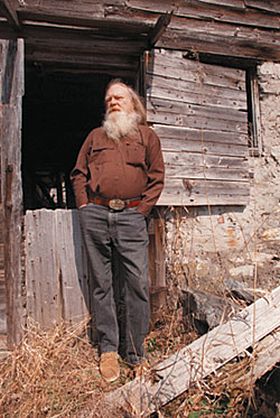
Hayden Carruth
b. August 3, 1921
photo by Al Campanie
Poems 1 2
Lives of a Poet - Hayden Carruth
Richard Mertens
Doctor Jazz by Hayden Carruth
Review by David Ingle
The Spun-Off Independent Dead-End Ten-Star Blast
Hayden Carruth
Conjunctions:16 Spring 1991
As a white artist influenced by and dependent on black American culture I want to say something about the place of subsidiarism in the arts in general.
Three sketches: The Talc mine
Hayden Carruth Hudson Review Spring 2003
.....................................................
In Measured Resistance: On Hayden Carruth's "Contra Mortem"
Christian Thompson
American Poetry Review Jul/Aug 2004
Carruth describes his condition as a neurotic, bordering on psychotic, fear of people and open spaces. Although, even now, when he talks about his illness one hears in his voice the inadequacy of any description. Despite his hospitalization, Carruth's condition did not improve. When he left the asylum, he went to his parents' home in Pleasantville, New York where he lived for five years in a make-shift room in the attic. There he listened to jazz and classical music, read, and, with great difficulty, wrote. He describes writing a line of poetry during that time as like "trying to squeeze glue out of an old, dried-up tube." With the exception of visits to his psychiatrist and late night attempts to walk to the end of the block while loaded with Thorazine, Carruth rarely left his room for much of that five year period.
It was during his time in the attic when Carruth discovered Camus. I am always moved when I imagine the serendipity of that discovery. Part of the pain of Carruth's illness was the severe contrast between the lucid, penetrating quality of his mind sabotaged by a deep and fundamentally inexplicable anxiety. The tension of living within a mind, the full beauty and power of which was crippled by a mysterious defect, fueled Carruth's sense of injustice. He had been living a sick joke at which he could not laugh until he read The Stranger. Camus invented a character (Meursault) who spoke to Carruth with all of the paradox, tension, and bewildered amazement at the circumstances of a particular life which Carruth harbored from his earliest memories, with one important exception: Meursault was free. The tone of his voice, what he chose to see, what he chose to ignore, reeked of an accomplished freedom Carruth never imagined possible until he read the first words uttered by the narrator of The Stranger: "Mother died today. Or, maybe, yesterday; I can't be sure." I like to think upon first reading those words Carruth smiled, paused, then began to laugh. He was hooked. I am sure he read the book several times, made notes, ruminated, made more notes....(more)
_______________________

Women bathing
Port Dover, August 1910
M. O. Hammond
1876-1934
Archives of Ontario
"one of a group of dedicated amateur photographers active in Toronto in the early 1900s. By profession, Hammond was a journalist who enjoyed a career at the Toronto Globe that lasted nearly 40 years."
_______________________
The ecology of capitalist intersubjectivity
Mark Jones
People will enjoy near- immortality amid wired-up techno-splendour. Enthusiasts from as Wired! argue that nothing short of runaway warming or general nuclear war can prevent this utopia. Of course the fate of the planet has possibly already been decided by anthropogenic changes to the ocean conveyor. But short of that, capitalism can survive almost anything: Massive human die-offs, the collapse of entire regions (Russia, Africa) -- all this is either new business opportunities, or can be ignored as evil but unavoidable friction-costs.(....)
Capitalism has long ago abandoned universalist ideas of development and rising standards for all. No-one objects. Under the guise of abandoning the neurosis, guilt and parsimony of the patriarchal personality, which was a principal social invention of 19th century capitalism, and stimulated by the mass conscription of women into the labour-force, there has been a resolute attempt to deconstruct the family as a residual instance of solidarity against capital, and to pull away the psychic supports of a personality-template organised around a psychic centre of sacrifice, heterosexual gender identity, sexual control and repression of the feminine. In its place we are witnessing the creation of a new personality-type adequate to global capital which has subordinated the family as well as the nation, commoditising their functions and liquidating the arsenal of atavistic symbols of community, mystery, sacrifice and other- directed struggle, seen as no longer required to legitimise bourgeois hegemony and objectively now only the rags of archaic value-system, absorbed by the deceitful misogynies of the New Right and no more than a menace to Neo-liberalism....(more)
_______________________

One of the city’s poor
M. O. Hammond
1905
_______________________
" We have all these knee-jerk phrases that in the sixties sounded like communist revolution, and now are just corpses in the mouths of real estate developers."
An Anarchist in the Hudson Valley
In Conversation: Peter Lamborn Wilson
aka Hakim Bey brooklynrail July 2004
Bleyer: Is there anything you could see altering the current course of the American empire?
Wilson: Yes. If all our emotion for resistance could somehow pull us together instead of apart. This is the brilliant thing they’ve managed to do—set us all at each other’s throats. If I think of the anarchist movement, we spend all our time screaming at each other over various sub-sectarian impurities we perceive in each other’s writing. That is what anarchist activity now boils down to. But it’s not entirely our fault—when there’s no movement, there’s no movement. But a new coherence could appear. Frankly, I think it would have to be of a spiritual nature. It would have to involve a kind of fanaticism that would involve real sacrifice—sacrifice of comforts, sacrifice of cell phones, sacrifice of this privileged life in the belly of the beast that we all acquiesce in. There’s a lot of symbolic discourse, but no action. I suppose that could come back, which is why I’m ready to cut slack for spiritual movements, which have nothing necessarily to do with religion. ...(more)
_______________________
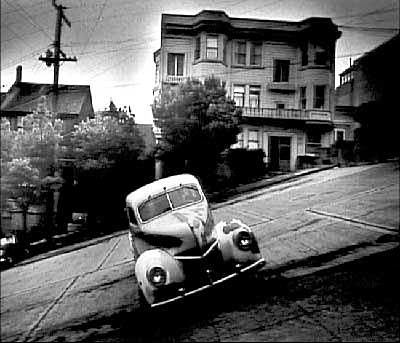 Ed Van der Elsken
_______________________
"Walking across the city. In the gaps left open by the masses of cars there are still a few isolated individuals, ashen pale or flushed, in incompatible states, and these people have subjected themselves to politics or world history, and amid the technological din they go around posing (like the figures shown in architectural drawings) at the foot of gigantic buildings, which are the essential while they are mere incidentals; moving through this catastrophe as through an underground hangar, I try to breathe everything in through my eyes, to preserve within me the forlorness of these people."
-
Peter Handke, The Weight of the World, translated by Ralph Manheim
_______________________
The Way Of The Coventicle Of The Trees
Hayden Carruth
Just yesterday afternoon I heard a man
Say he lived in a house with no windows
The door of which was locked on the outside.
This was at a party in New York, New York.
A deep Oriental type, I said to myself,
One of them indescribable Tebootans who
Habitate on Quaker Heights and drink
Mulled kvass first thing every morning
With their vitamins. An asshole. And
Haven't I more years than he? Haven't
I spent them looking out the window
At the trees? Oh the various trees.
They have looked back at me with their
Homely American faces: the hemlocks
And white birches of one of my transient
Homes, the catalpas and honey locusts
Of another, the sweet gum and bay and
Coffee trees, the hop hornbeam and the
Spindle tree, the dogwood, the great.
Horse chestnut, the overdressed pawpaw
Who is the gamin of that dominion.
Then, behind them, the forest, the sodality.
What pizzazz in their theorizing! How fat
The sentimentibilities of their hosannas!
I have looked at them out the window
So intently and persistently that always
My who-I-am has gone out among them
Where the fluttering ideas beckon. Yes,
We've been best friends these sixty-nine
Years, standing around this hot stove
Of a world, hawking, phewing, guffawing,
My dear ones, who will remember me
For a long, long time when I'm gone.
_______________________
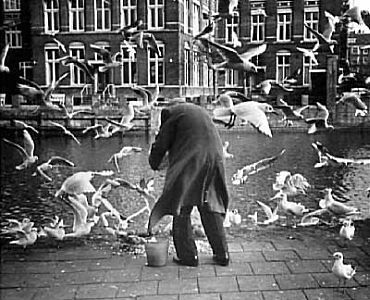
Ed Van der Elsken
(1925 - 1990)
Nederlands fotomuseum
_______________________
"When as a child I first experienced myself as a ghostly event in the symbol-free world, I knew that my self would keep me busy for the rest of my life (that I would never finish thinking myself through."
"By evening I had at last - once again - thought myself free: in that moment I raised my head."
-
Peter Handke, The Weight of the World, translated by Ralph Manheim
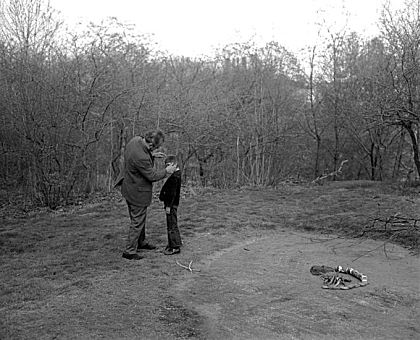
Capturing a ritual ...
Tod Papageorge's best shot
Alec Soth interviews Tod Papageorge
Walker Evans and Robert Frank: An Essay on Influence
Tod Papageorge
_______________________
from
Oracular
Maxine Chernoff
(....)
How conscience gets extinguished
with threadbare slogans.
Let us now praise embryonic growth,
One thousand poems about the same cathedral,
fixations and ruses, earth-worn objects
and those who love them.
Maxine Chernoff, Three poems
12 or 20 questions: with Maxine Chernoff
Rob Mclennan
_______________________
Brain Drain Against the Grain:
A Report on Against the Grain: Reading Pynchon's Counternarratives, International Pynchon Week 2008
Bruno Arich-Gerz
..the remarkably theory-saturated approaches of the 1990s and early 2000s have, as McHoul and Wills explained, often explicitly abandoned the idea of exegetically tracing (and explaining) the "'actual,' 'underlying' rationale for Pynchon's writing". The preference, in this earlier mode of Pynchon criticism, was for drifting along with the author's own signs, symptoms, and signifiers, allowing Pynchon's literature to be "bookmatched" with Derridean (and other theorists') assumptions in such a way that the demarcation between the subject and method of analysis is deliberately blurred.(....)
If Pynchon's is a prose that goes against the grain, and if these critical examples likewise overtly or covertly oppose the prevailing standards of literary studies, the Munich conference saw astoundingly many scholars backlashing and falling back into speculation about possible sources (or intertextual connections) and biographical criticism....(more)
_______________________
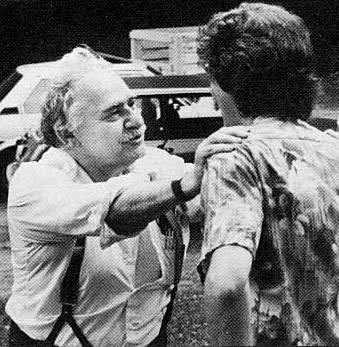
Murray Bookchin
(January 14, 1921 – July 30, 2006) Bookchin Archive
"Perhaps the most compelling real fact that radicals in our era have not adequately faced" wrote Murray Bookchin in 1991, "is the fact that capitalism today has become a society, not only an economy". Encapsulated in this one sentence is the essence of what drove this autodidactic scholar, who died on 30 July 2006, aged 85, to a prolific output of writing and research spanning the last 50 years. That essence was the commitment to the belief that analysis of social crises and transformation, and the revolutionary action required thereon, ought to have a much wider focus than a strictly economic one.
- Andy Price
Social Anarchism or Lifestyle Anarchism - An Unbridgeable Chasm
Murray Bookchin
_______________________
Economic Free Fall?
William Greider
Washington can act with breathtaking urgency when the right people want something done. In this case, the people are Wall Street's titans, who are scared witless at the prospect of their historic implosion. Congress quickly agreed to enact a gargantuan bailout, with more to come, to calm the anxieties and halt the deflation of Wall Street giants. Put aside partisan bickering, no time for hearings, no need to think through the deeper implications. We haven't seen "bipartisan cooperation" like this since Washington decided to invade Iraq. (....)
The next President, once in office, can break the bad news. It's not only about the money--with debate silenced, a dangerous line has been crossed. Hundreds of billions in open-ended relief has been delivered to the largest and most powerful mega-banks and investment firms, while government offers only weak gestures of sympathy for struggling producers, workers and consumers.
The bailouts are rewarding the very people and institutions whose reckless behavior caused this financial mess....(more)
_______________________
The Public Reading Rooms
infinite thØught
Just received a message about this. I'm signing up for life.
"The true, greatly misunderstood collector is always anarchistic, destructive. For this is its dialectics: to combine with loyalty to an object, to individual items, to things sheltered in his care, a stubborn subversive protest against the typical, the classifiable" - Walter Benjamin
At the end of August the Porcupine Bookcellar in Kings Cross will close its doors for the last time. In its place will arise The Public Reading Rooms. It will have the following objectives:
1] This will be a project which will archive and document the many lost causes and small movements which litter our collective existence. The material covered will be pamphlets, books, magazines, badges, photographs and posters. Areas archived will include: the situs, underground newspapers, fanzines, the sixties, class war, solidarity, anarchy, left communism, conscientious objection, Maoism in England, rock against racism, Peter Kennard, Clifford Harper, deviant trotskyism, Walter Benjamin, radical feminism, squatting, Frank Zappa, lesbian separatism and the 1970s mens movement and many others....(more)
_______________________
Medea and Her War Machines
Ioan Flora
translated from the Romanian by Adam J Sorkin with Alina Cåråc
Archipelago
from
About Raising the Waters to the Heights
Once again, as if nailed to this oak bench, I sit at the oak table
in the kitchen garden, pensively watching
the neat rows of tomatoes, garlic, cabbage,
the dill that has no intention of growing
under my eye greedy for the real.
As I have said, at the low table I leaf through random chapters of
the massive document where the author explains,
in the most minute detail,
how a truly enlightened Battle Commander can subdue
a walled city, however proud, defiant, hostile:
“Without the water of the river that courses through the city, the mills are doomed,
and along with them, the tanners’ trade as well as the wool and dye shops;
soon the city’s populace must decide to yield to the greater power
and be grateful with obedience.”
(....)
I sit on this oak bench, at the oak table
in the kitchen garden:
crickets, horseflies, the rains soon to come, the forest
(not the hill) set in motion,
the Doberman Le Duc gnawing the afternoon away on a sheep’s shank-bone,
Paul and Doina who are supposed to arrive any moment,
the apple tree in full bloom,
the Sauvignon in my torpid glance, frosted with mist,
a sparkle in the dusk.
...(more)
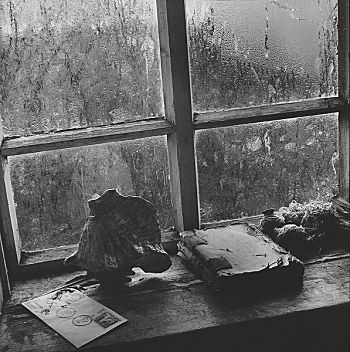
On The Ground
Galina Lukyanova
Photographer.Ru
_______________________
from
The Far Field
Theodore Roethke
May 25, 1908 - August 1, 1963
The lost self changes,
Turning toward the sea,
A sea-shape turning around, --
An old man with his feet before the fire,
In robes of green, in garments of adieu.
A man faced with his own immensity
Wakes all the waves, all their loose wandering fire.
The murmur of the absolute, the why
Of being born falls on his naked ears.
His spirit moves like monumental wind
That gentles on a sunny blue plateau.
He is the end of things, the final man.
All finite things reveal infinitude:
The mountain with its singular bright shade
Like the blue shine on freshly frozen snow,
The after-light upon ice-burdened pines;
Odor of basswood on a mountain-slope,
A scent beloved of bees;
Silence of water above a sunken tree :
The pure serene of memory in one man, --
A ripple widening from a single stone
Winding around the waters of the world.
...(more)
_______________________
Radical Theory/Critical Practice: Making a Difference Beyond the Academy?
Edited by Duncan Fuller and Rob Kitchin
Critical Geographies: A Collection of Readings
Edited by Harald Bauder and Salvatore Engel-Di Mauro
Praxis (e)Press
open access e-book publishing house located at the University of British Columbia in Kelowna, British Columbia, Canada.
.....................................................
Geographies of Everyday Citizenship
ACME: An International E-Journal for Critical Geographies
thanks to Critical Spatial Practice
_______________________
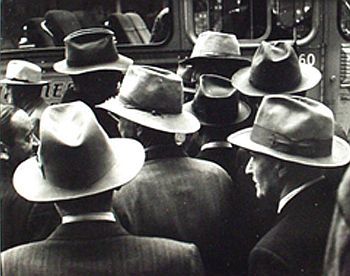
William Heick
_______________________
Six Years Of LanguagehatCongratulations and many thanks - mw
_______________________
Issue ten of Otoliths
from
The Unfinished
Mark DuCharme
otoliths
2/
What does it mean to finish
What was said
Finish others’ sentences
As if one were a Finn or an onlooker
Unwanting through repeat delirium
Or rumor: I repeat
There is dust on the windowsills that no one looks
At a steady mark of reflection
Whose “finishing touches” defy the outbound
The reckless, militantly inward
...(more)
_______________________
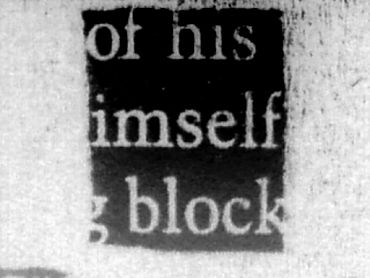
from Stampologue
Nico Vassilakis
DIAGRAM :: 4.2
.....................................................
An Interview with Nico Vassilakis
Tom Beckett
otoliths
How to begin. In order to say the word language you are forced to use language. The impossible nature of getting there. Finding your aleatoric self among the pencils. Here. An alerted poise of tumult. When staring bores an opening it defines the border where breathable atmosphere and unrelenting space meet. The curve of the earth. Accumulation of lived experiencing. Filling the satchel. With thought, with movement, with decisions over both. Mostly it is documenting. The relation between chemical interface and its effect on thinking. Where mind clarifies chaos. Hones in on the attention it requires. Hallucinating the possibilities that generate a reason to speak/write outside of self. And the catalyst. Staring formulates a holding pattern writing prepares for. Poetry, always the support. The base of a totem. The basis of all expressing. It just exists throughout. It never begins.
TB: I think it interesting that you responded to my question in terms of language, chance, attention and hallucination. I may come back to that. The phrase I want to hone in on though is: "Mostly it is documenting." Can you expand on that, expand on the role of documentation in your work?
NV: Writing as field recording device. Stenographer’s translation. A mental projectile complete with thought, both verbal and visual, memory, external stimuli affecting our five senses, etc. How uncomfortable is it to say, I document what thinking arranges for me. It’s a situation I observe. Where my thinking goes. Watching my thinking think. Documenting my staring. Evidence against the collapsing scaffold of convenience. Maturation of time. Lengths of time within which experience and life matter accrue. Getting ready to write for writing. For documenting....(more)
_______________________
I want a poetry that’s as corrosive as dreams.
- Alan Gilbert
_______________________

Galina Lukyanova
_______________________
Philosophy and Social Hope
Richard Rorty
I hope that the papers in this volume may help convince people that relativism is a bugbear, and that the real question about the utility of the old Platonic dualisms is whether or not their deployment weakens our sense of human solidarity. I read Dewey as saying that discarding these dualisms will help bring us together, by enabling us to realize that trust, social cooperation and social hope are where our humanity begins and ends.downloadable here
|
